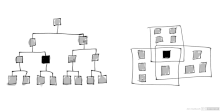Facet search
With the facet search or facet navigation, search hits are narrowed down using a facet classification, for example in product or library catalogs . The facets use metadata of the respective entries for filtering .
classification
Using a hierarchical classification , search hits can be restricted step by step ( drill-down ), but (sub) categories of other subtrees can no longer be accessed. With a facet classification, however, previous restrictions can be lifted without giving up later ones. By filtering over independent categories, a Boolean query is built up incrementally , with which the entire database is searched every time.
The facets are either derived from existing metadata or obtained through text analysis ( information extraction ). The faceted search has also been expanded to deal with semi-structured data , continuous dimensions and social tagging .
use
The faceted search is a popular technique, especially in electronic commerce and libraries . They are supported by a growing number of enterprise search providers .
science
In science , the faceted search has aroused interest, especially in the BID area , partly also in the information retrieval area . The main scientific efforts are as follows:
- CiteSeer x allows a facet search for scientific publications .
- Apache Solr is a search platform based on Lucene.
Electronic commerce
Because of the multifaceted nature of product data (type, brand, price, etc.), early applications of facet search were co-developed by electronic commerce . At the beginning of 2000 the retail sector began to use the faceted search, which led to its ubiquity in online shops from 2012 onwards.
Libraries
The librarian SR Ranganathan was a strong proponent of the facet classification when he failed to replace the Dewey decimal classification with his Colon classification . Nevertheless, OPACs have increasingly introduced the faceted search . Well-known examples are the North Carolina State University library catalog (part of the Triangle Research Libraries Network ) and WorldCat .
See also
Individual evidence
- ↑ Internet Retailer: Most new e-commerce platforms designed with 'faceted' search, Venda says (2007)
- ↑ Major classification systems: the Dewey Centennial
